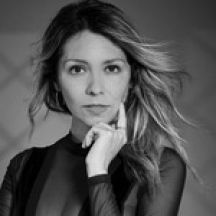Fanny Deniau El Maïmouni (@fannyfrommarrakech), French by birth, but a resident of Marrakech since 2016, Fanny has fully embraced the vibrant culture and landscapes of Morocco. A self-taught artist with an acute sensitivity to visual aesthetics, Fanny has been dedicated to the craft of street photography for over fifteen years. The luminous beauty of Morocco and her love for the country have been pivotal in igniting her artistic sensitivity and shaping her unique perspective behind the lens.
Her exceptional talent has not gone unnoticed; she has garnered international recognition through numerous photography competitions, earning honorable mentions and medals consistently since 2018. Fanny spoke to me about inspiration, her journey, and the stories behind her photographs.
FFU: Thanks so much Fanny for taking some time to speak to me. So, let's get to it. Why photography? How did you get started?
FDM: Photography is a way for me to convey emotions. As a self-taught photographer, I began photographing my travels before moving to Morocco. At the same time, I was shooting the clothes that I sold when I had this activity when I lived in France, photographing female models. When I moved to Marrakech in 2016, I photographed a lot of Morocco, initially for my agency, where I organise events. I liked taking photos of the streets, the people people, and my work turned into street photography, increasingly conveying emotions through my lens.
© Fanny Deniau-El Maïmouni, Along the Wall.
FFU: You are one of the 14 winning photographers in our exhibition Photography: the Universal Language. What prompted you to apply?
FDM: Several people thought of me when they sent me the competition announcement for this exhibition. The theme spoke to me, as did the location, as I knew of Musée de la Femme in Marrakech. I saw it as an opportunity to talk about women photographers and women in the Arab World. So, naturally I applied.
FFU: Tell us about your winning images.
FDM: My two winning photos are from a series called Along the Wall, which are photos of scenes of life in Morocco, where I captured poetic moments in the street.
FFU: How do you communicate through your images? What stories do you tell through your photographs? Can you discuss the role that photography plays in storytelling, whether it's about personal stories or wider social issues?
FDM: My photos are personal and tell my story. My best definition is that they are poetry in pictures. I've often been told that they look like paintings, that's what I try to do.
FFU: How do you stay inspired and continue to develop as a photographer? Are there any resources or practices that you find particularly useful?
FDM: To stay inspired, you have to keep practising photography and feed your inspiration. Whether it's through books, films, photo exhibitions or music. Whenever I can, I go and see all kinds of artists, which allow me to see other approaches, other points of view, other stories. I also enter photography competitions (every year I enter one or two), this helps me see whether or not my work attracts the attention of professional juries.
FFU: What equipment do you usually use and why do you prefer it for your work?
FDM: I mainly use a digital camera. I like the Fujifilm xt2, which is a complete camera and fairly easy to use.

FFU: What has been your favourite image so far in your career and why?
FDM: My favourite photo is Djellaba, which is a minimalist minimalist silhouette. It's my favourite photo, it's the best for me. It's a bit of my personal history, a bit of poetry, minimalist, and a living painting. It has won numerous prizes and honourable mentions in international photography competitions.
FFU: It's absolutely poetic, that's the word I'd use as well. How would you describe your photographic style or approach? Are there any particular influences that have shaped your style?
FDM: The style kind of imposed itself on me. While shooting, I discovered that I was able to convey emotions with my minimalist street photography, urbex.
FFU: Regardless of where you are in your career, what advice would you give to beginning photographers looking to improve their skills or get started in the industry?
FDM: I don't necessarily have any advice, except to get started and not be afraid. I, for one, waited many, many years before daring to show my work and exhibit my photos. I was encouraged to do so by several artists. I don't regret it, in fact it's more than I could have hoped for.
FFU: What projects or objectives do you have on the horizon? What can we expect from you in the future?
FDM: My aim is to continue on my path. Capture and transmit emotions through photography, and telling poems in pictures.








